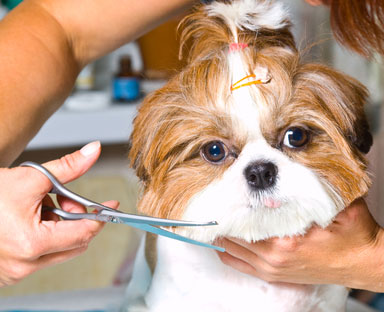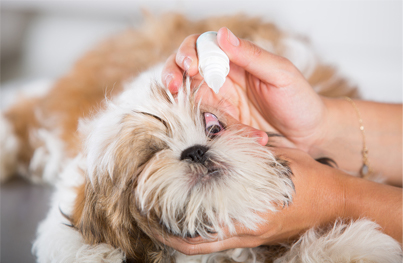

Are your dog’s eyes a constant mess? Don’t feel alone. Running and tearing eyes are some of the most common problems Shih Tzu owners face, which is why Shih Tzu eye care is extremely important. Shih Tzus are prone to eye problems due to their protruding eyes. The amount of hair that can touch and irritate the eye does not help. There can be several reasons for running eyes, but one not to ignore is Dry Eye, also known as Keratoconjunctivitis Sicca.
Shih Tzu Eye Care: What is Dry Eye?
To understand Dry Eye better, we must first look at the function of tears.
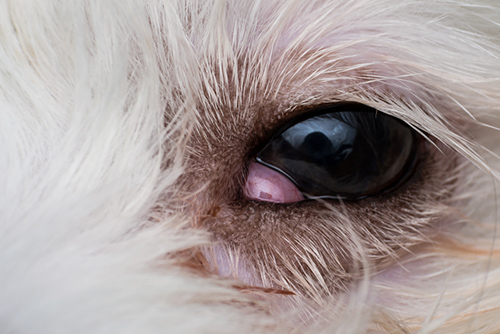
Tears consist of oils, mucus, and about 95% water. They’re important because they lubricate the eyes, have antibacterial qualities, and contain sugars, salts, and oxygen that nourish them.
Tears also flush away any irritants that get in the eyes, like dust.
Dry Eyes result when the tear glands do not produce enough tears (the watery part of the tear) to lubricate the eyes.
Symptoms of Dry Eye
- A yellow/green discharge from the eyes. This happens because the oil-to-water ratio is too high.
- Bacteria overgrowth occurs when the tears do not remove dust and other particles.
- Irritated eyes due to the bacteria overgrowth and dust.
Causes of Dry Eye
- The most common cause is the destruction of the tear glands due to an immune reaction. The exact reason why it happens is still unknown.
- Infections or trauma that causes damage to the tear glands.
- A lack of tear-producing tissue. This is normally inherited.
- Antibiotics containing sulfa
- Distemper infection
How do you know if your Shih Tzus Eye is Dry?
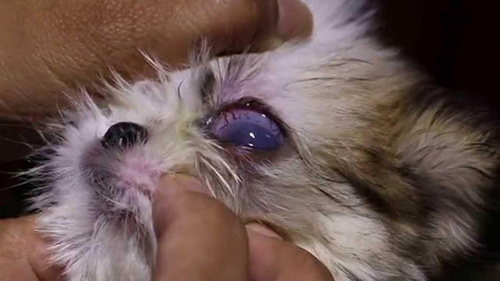
You can look at the symptoms, but the easiest and best way is to take your dog to the vet. The vet will place special paper (known as a Schirmer tear test strip) under the dog’s eyelid and leave it there for about a minute.
After one minute, the vet will remove the paper and measure the wetness of the strip. Your Shih Tzu may suffer from Dry Eye if the results are below average.
Dangers of Dry Eye
Your dog will initially suffer from chronic eye infections, and frequent scarring will damage the cornea. Once corneal ulceration has developed, extra care should be taken as it can lead to blindness.
What are your options if your Shih Tzu is diagnosed with this condition?
Finding the cause is not easy; you may do better to prevent any damage the condition can cause. However, if your vet cannot find the cause, he will prescribe eye drops.

The most frequently used drops are Cyclosporine ophthalmic ointment. They suppress the immune reaction, the most frequent cause of this condition.
Surgery is also an option, although it is not frequently used. During surgery, a salivary duct is transplanted into the upper eyelid area.
The result is that saliva drains into the eye, providing the necessary lubrication.
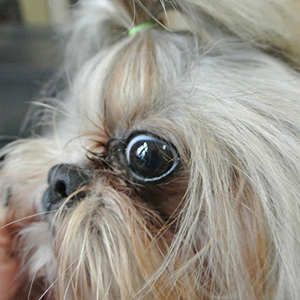
Just like human eyes, Shih Tzus’s eyes are sensitive. However, dogs cannot keep their eyes clean and healthy, unlike humans. Because of this dilemma, proper Shih Tzu eye care is essential.
Eye infections in Shih Tzus can appear at any time; therefore, humans should check their eyes often for signs of injury or disease. If a problem is detected, a veterinarian should treat it immediately.
Any Shih Tzu can experience eye issues, ranging from a mild case to a severe case, which can lead to the loss of an eye. Healthy eyes should always be moist and display no cloudiness, mucous discharge, swelling, cloudiness, and redness.
Learn more about Shih Tzu eye care and Shih Tzu Health Issues
DISCLAIMER: The information on shihtzudoginformation.com is intended for general knowledge and informational purposes only. The content is not a substitute for professional veterinary advice, diagnosis, or treatment. Always seek the advice of your veterinarian or other qualified animal health provider with any questions you may have regarding your dog’s health or medical condition.
References
- UFAW: https://www.ufaw.org.uk/dogs/shih-tzu-brachycephalic-ocular-syndrome
- ResearchGate: https://www.researchgate.net/publication/363264136_An_eye_on_the_Shih_Tzu_dog_Ophthalmic_examination_findings_and_ocular_surface_diagnostics
- WebMD: https://www.webmd.com/pets/dogs/dogs-and-tear-stains
- American College of Veterinary Ophthalmologists (ACVO): https://www.acvo.org
- Veterinary Partner: https://veterinarypartner.vin.com




